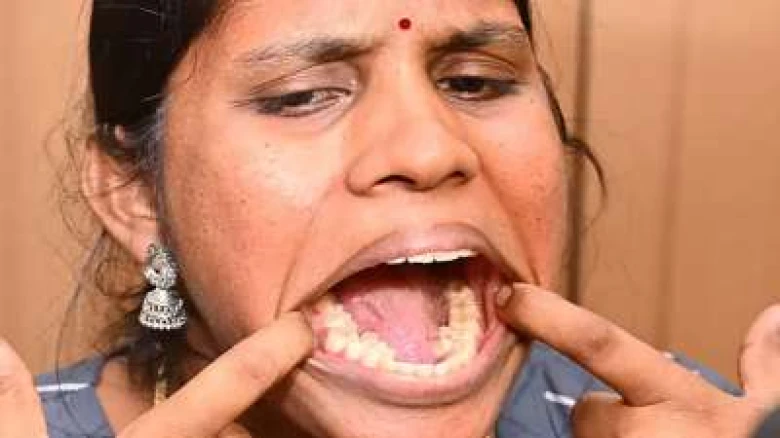Regional

The record-breaking achievement stems from Balan's possession of four extra mandibular (lower jaw) teeth and...
Digital Desk: A 26-year-old Indian woman has etched her name in the Guinness World Record. Kalpana Balan, a mother of one, now holds the title for the highest number of teeth in a female's mouth, boasting an extraordinary count of 38 teeth, surpassing the typical adult count by six.
The record-breaking achievement stems from Balan's possession of four extra mandibular (lower jaw) teeth and two additional maxillary (upper jaw) teeth. Her journey with these surplus teeth commenced during her teenage years, where they gradually emerged one by one. Despite facing challenges with trapped food between the extra teeth, Balan remarkably experienced no pain.
When Balan's parents discovered the additional set of teeth, they suggested extraction. However, her dentist advised waiting as the removal process was complex, leading Balan to choose retaining the teeth despite their growth completion.
Expressing her elation, Balan stated, "I am so happy to get the Guinness World Records title. It's my lifetime achievement."
Balan, who currently holds the female record, remains with two unfilled teeth, suggesting a potential extension of her record in the future. The male record holder for this title is Evano Mellone from Canada, boasting a total of 41 teeth.
Medical experts term the condition of excess teeth as hyperdontia or polydontia, affecting up to 3.8% of the global population. GWR reports that hyperdontia results from a malfunction in the tooth formation process, possibly arising from an extra tooth bud or the splitting of a regular tooth bud.
Kalpana Balan's extraordinary dental anomaly not only secures her a place in history but also sheds light on the fascinating yet rare occurrences within the realm of medical anomalies.
"The medical term for the presence of excess teeth is hyperdontia or polydontia. Up to 3.8% of the world's population have one or more supernumerary teeth. Hyperdontia is the result of a malfunction in the tooth formation process, although its exact cause is unknown. It is thought that supernumerary teeth develop from an extra tooth bud arising near a regular tooth bud, or possibly from the splitting of a regular tooth bud," reports GWR.
Leave A Comment